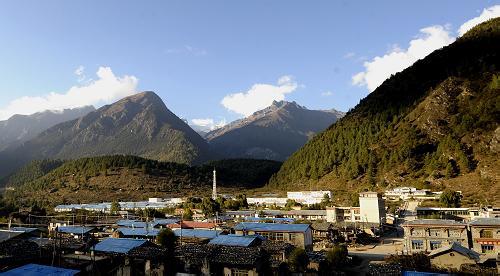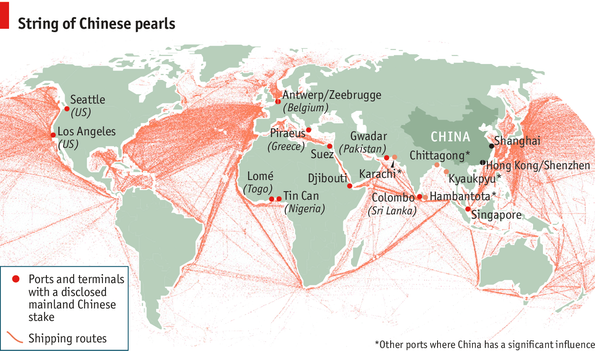Chinese management skills and business activity also builds increased activity in other ports. For example, activity in the Greek port of Piraeus has tripled since Chinese giant Cosco bought half the management rights.
Seated in his pristine office overlooking the port of Piraeus, Captain Fu Cheng Qiu sums up the magnitude of China's interest in Greece.
"No other country in Europe offers such potential," he says as cranes in constant motion move containers from ship to dock outside. "We believe that Piraeus can be the biggest port in the Mediterranean and one of the most important distribution centres because it is the gateway to the Balkans and southern Europe."
Five years ago, Fu's employer, the global shipping carrier Cosco, acquired the management rights of half of the port in a €500m (£400m) deal that has seen business activity triple. Under the Chinese company's watch, about 6,000 containers a day are transferred through the terminal with breathtaking efficiency. "It's a huge investment that is teaching us a lot about management skills in a foreign country," says Fu, who has overseen the remodelling and expansion of the piers now controlled by Cosco under the 35-year concession.
As the Chinese premier, Li Keqiang, arrives to conduct an official three-day visit to Greece, it will be the success of China's state-run shipping group at the forefront of talks. With Beijing hoping to further cement its foothold in a country viewed as offering the easiest entrance to Europe commercially, Chinese officials are eager to replicate Cosco's business model elsewhere. "The Chinese and Greek economies are mutually complementary," Li wrote on Wednesday in the conservative daily Kathimerini. "Greece is accelerating privatisation and infrastructure construction. China will encourage its well-established enterprises to play an active part in this process."
Already China has expressed interest in purchasing the port of Thessaloniki, Greece's state-run railway network and a majority stake in the other half of the port of Piraeus still under government control. All three are expected to be put to international tender as part of an asset-stripping drive aimed at trimming the twice-bailout country's monumental debt load. Rumours are swirling that Athens' international airport – and new international airport on Crete – will be added to the list.
"China wants more cooperation with Greece in airport, rail, road and other infrastructure development," added Li, insisting that tourism would also become an important growth area. "In this fast-changing world, China and the EU, as the biggest developing country and the biggest bloc of developed countries in the world, share common interests and have a greater need for each other."
The enthusiasm is echoed by Greek officials. Nearly five years into its worst economic crisis in living memory, Greece is thirsty for investment seeing it as the easiest way to offset an unemployment rate that at 26.7% remains the highest in the EU.
"Cosco's presence in the port of Pireaus … has brought great benefits to the Greek public sector," the merchant marine minister Miltiades Varvitsiotis said last week as he dismissed suggestions that Beijing was exploiting Greece because of the bargain prices at which much of its infrastructure was being sold. "It has proved to be one of the most important and profitable investments to have to happened in a global harbour … and because of this we are trying every day to reinforce this relationship."
For Spyros Mercouris, who is seen as the arbiter of improved cultural ties with China – the basis for the economic cooperation now taking root – that relationship is as much about the two nations shared sense of history as the very modern demands of globalisation.
"There's a shared sense of belonging to ancient civilisations that has helped lay the foundations for what we are seeing now," says Mercouris who has organised several groundbreaking shows in China as Greece's pre-eminent curator of exhibitions. "It has helped cut the vast distance between the two countries."
Cosco's presence has fast turned Greece into a portal through which Chinese products are daily passed into the European Union – a strategic plan that Beijing intends to take further with the expansion of processing rights enabling it to ship goods under EU label.
With investors also poring in, the surge of interest has reanimated Athens' resident Chinese community. "Our phones are ringing off the hook," says Li Ang, who heads the capital's Greek-Chinese Commercial and Cultural Association. "Investors want to buy five-star hotels, wineries and olive oil companies … people who left with economic crisis are flooding back. Greece is a great place to do business in and the prices are very good."






